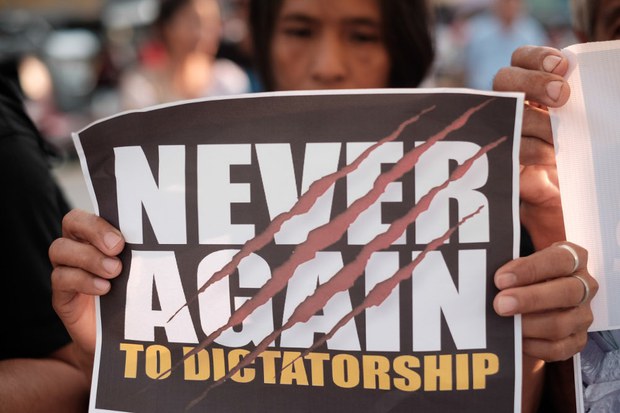Philippine Martial Law Victims Appeal for Fund Deadline Extension
2018.08.06
Davao City, Philippines
 A protester holds a sign proclaiming "never again to dictatorship" during a rally in the northern Philippine city of Dagupan on the 45th anniversary of the declaration of martial law by the late dictator Ferdinand Marcos, Sept. 21, 2017.
A protester holds a sign proclaiming "never again to dictatorship" during a rally in the northern Philippine city of Dagupan on the 45th anniversary of the declaration of martial law by the late dictator Ferdinand Marcos, Sept. 21, 2017.
Thousands of human rights victims under the late dictator Philippine Ferdinand Marcos appealed to the government Monday to extend the availability of 800 million pesos (about U.S. $15 million) in reparation funds that is due to expire this month.
The fund is currently under the management of the Human Rights Victims Claims Board’s account in the state-run Land Bank of the Philippines. But it would only be maintained until Aug. 11, before it reverts back to the government’s treasury bureau.
But a group of martial law victims, known by its Filipino acronym SELDA, said many of the claimants have not received a cent from the fund largely because of clerical errors related to processing of their documents.
“After so many hurdles before being able to receive reparation and recognition, we do not want to leave anyone behind, especially the legitimate victims of martial law,” the group’s leader, Trinidad Herrera-Repuno, told reporters.
“Ultimately, we should make sure that all funds intended for the victims and their kin should be given to them,” said Herrera-Repuno, who was raped and tortured while working as a community organizer in the 1970s at the height of Marcos’ martial law.
“We are concerned that many martial law victims from different parts of the country might not be able to resolve these issues before the said date. Ultimately, it would be a disservice and injustice for the legitimate victims to be denied receipt what is justly theirs,” she said.
“It is our responsibility, even when many of us have received reparation, to call on the government to do something to address this,” Herrera-Repuno said.
The group cited the case of Cresencia Hizarsa, common-law wife of Abner Hizarsa, an anti-Marcos activist who was also tortured and detained but survived. He went missing in 2007, allegedly in a case his colleagues believed could be related to his activism.
His wife, Cresencia, filed for claims in his absence. But despite filing all the requirements needed to claim his martial law compensation, the board still issued a check payable only to Abner, making it impossible for his wife to access the money.
With the claims board already expiring its mandate, Herrera-Repuno urged Congress dominated by allies of President Rodrigo Duterte to issue a resolution extending the validity of the funds.
Duterte is a known admirer of Marcos, and months after he became president in 2016, he defied international and local critics and transferred the late dictator’s remains to the Heroes’ Cemetery in Manila.
He had credited Marcos’ eldest daughter, Imee Marcos, for helping him win the presidency and has also actively supported her brother, former Sen. Ferdinand Marcos Jr., in his losing bid for the vice presidency.
Officials of a government agency that was trying to recover Marcos’ ill-gotten wealth believe that the late authoritarian leader plundered up to $10 billion from government coffers during his two decades in power, much of it under brutal dictatorship. Thousands of activists went missing and were presumed dead, while thousands of others had survived to live to tell tales of horror under captivity.
In 1983, Marcos’ arch political rival and former Sen. Benigno Aquino returned to the country from exile in the United States, and was gunned down while under military escort shortly after landing at the Manila airport. His death snowballed into a “people power” revolt in 1986, forcing Marcos and his family into Hawaiian exile, where he died three years later.
But Marcos’ flamboyant widow, Imelda, and children were allowed to return home, where they eventually consolidated their political clout in the northern Philippines. Marcos Jr. became a senator but lost the vice presidential race in 2016.
Imelda, however, won a seat in Congress, while her daughter Imee won as governor of Ilocos Norte province, the family’s political bailiwick.
Karl Romano in Dagupan City contributed to this report.







